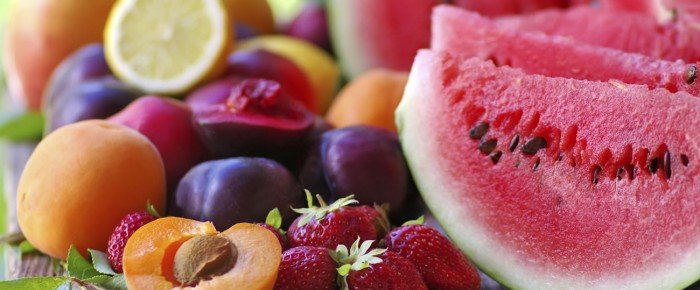Best Fruits | 12 Fruits That Just Love Improving Your Health
This list will help you determine the best fruits for your health. But always keep in mind that you really can’t go wrong with fruit, any fruit. Virtually all are great choices for your overall health and weight-loss efforts.

This list will help you determine the best fruits for your health. But always keep in mind that you really can’t go wrong with fruit, any fruit. Virtually all are great choices for your overall health and weight-loss efforts.
Acai Berries
Acai berries grow on Acai palm trees in Central and South America. These berries are a deep, reddish purple color, approximately 1 inch long. The rich pulp of acai berries contains beneficial antioxidants, fiber, and healthy fats. These super berries may aid in weight loss. Some people eat acai berries to improve symptoms associated with arthritis and cancer, although these benefits are not proven health facts.
Apricots
Apricots are small, orange, pitted fruits. These fruits originated in China, but arrived in American during the 18th century. Apricots contain antioxidants that can improve health. Apricots have high levels of beta-carotene and flavonols, which can help reduce heart disease. Eating apricots may protect eye sight and help reduce inflammation.
Avocado
Avocados qualify as fruits due to the seed that grows inside them. Avocados contain potassium, lutein, folate, and fiber. Avocados also contain vitamins B, C, and E, which can help fight infections. Avocados are also a beneficial source of mono-saturated fat, which can improve cholesterol levels.
Berries
Many berries contain high levels of nutrients, vitamins and antioxidants, making them beneficial for health. Adding blackberries, blueberries, black and red raspberries, and strawberries to your diet can provide you with fiber, flavonols, and antioxidants such as gallic acid, catechins, and phytochemicals. These antioxidants help fight diseases and protect cells within the body.
Citrus Fruits
Citrus fruits include oranges, grapefruits, lemons, limes, mandarin oranges, and tangerines. These fruits contain high levels of vitamin C, as well as folate, potassium, and fiber. Eating citrus fruits can help prevent and fight infection and disease. Some citrus fruits are exceptionally sweet and others are very sour, but all contain beneficial nutrients.
Tart Cherries
Tart cherries contain antioxidants and anti-inflammatory properties that may even have a chelating effect in the body with free radicals. This means that tart cherries can help neutralize harmful molecules in the body that could cause disease. Cherries may also assist with cell repair in the body.
Dragon Fruit
Dragon fruit grows on a cactus in Central and South America. These are red or pink on the outside, with white flesh and tiny black seeds on the inside. Eating dragon fruit may strengthen the immune system, and it could improve diabetic symptoms. Dragon fruit contains fiber, vitamin C and antioxidants.
Grapes
Grapes date back thousands of years. Over 8,000 varieties of grapes grow on the earth today. Flavonols in grapes produce their colors. Grapes also contain caffeic acid, which can help fight some cancers. Grapes are a rich source of vitamins C and K, as well.
Melons
Cantaloupe, honeydew and watermelon are three common types of melons. Melons contain high concentrations of vitamin C. Melons also contain carotenoids, which produce their vivid colors. Carotenoids are antioxidants that may reduce cancer risk and inflammation. When storing melons, leave them uncut until you are ready to eat them, because slicing and then storing may reduce the amount of carotenoids and vitamin C they contain.
Papaya
Papaya contains high amounts of vitamins A and C, as well as potassium and folate. Many different varieties of papaya offer a wealth of options when adding them to a diet. Papain enzymes present in green papaya can help tenderize meat. Papaya extract may work as an antibiotic to fight some kinds of bacteria.
Pineapple
Pineapple contains vitamin C, fiber, potassium, and calcium. The antioxidants present in pineapple may also fight free radicals in the body. Eating pineapple may aid in digestion, and it may help prevent macular degeneration, as well. People in some regions soak fresh pineapple in salt water before eating it.
Pomegranate
Pomegranate contains antioxidants and vitamin C. Pomegranate may help the body resist cancer, heart disease, and osteoarthritis. Some herbal medicines contain both the fruit and the seeds of pomegranate. Pomegranate rinds may contain toxic compounds, however.
- Look to Fruits and Vegetables for Good Eye Health – This web page explores how fruits can benefit eye health.
- What are Acai Berries, and What Are Their Possible Health Benefits? – This web page answers questions about acai berries.
- Apricots – Learn the health benefits of apricots on this web page.
- All About Avocados – This web page presents information about the nutritional benefits of avocados.
- Berries: Fact Sheet – Explore this list of common nutrients found in many different berries.
- Citrus Fruits: Vitamin C and More – Learn about the nutritional benefits of various citrus fruits.
- Tart Cherries – This publication presents facts and benefits of tart cherries.
- Dragon Fruit (Pitaya) – Learn about the nutritional content of dragon fruit in this brochure.
- Grape Benefits – Explore the history and health benefits of grapes and raisins on this web page.
- Maximize Your Nutrients from Melons – This publication provides an overview of the benefits of melons.
- Papaya Information – Learn about the history of papaya, as well as health benefits, on this web page.
- Benefits and Uses of Pineapple – This publication provides information about pineapple properties and their health benefits.
- Pomegranate Facts – Explore details and benefits of pomegranates on this web page.
- How to Use Fruits and Vegetables to Help Manage Your Weight – The CDC offers tips for adding more fruits to the diet.